

Winter brings a number of seasonal health risks, mainly related to the physical challenges of ice, snow, and cold. A range of health conditions exist year round but are heightened in the colder months because the weather creates circumstances that feed contagion — staying indoors with more opportunities for person to person sharing of microbes.
In fact, the Centers for Disease Control and Prevention reports that there are far more deaths in winter than summer. The averages of daily deaths in December, January, and February are 8,344, 8,478, and 8,351, respectively; while the averages in June, July, and August are 7,298, 7,157, and 7,158, respectively.
There are a number of ways to protect against cold weather health problems, and they do not include wearing a hat and buttoning up your overcoat, except in extreme conditions where frostbite and hyperthermia are threats. It is a myth that not wearing a coat can cause a cold and that a hat is necessary because most body heat exists through your head — it doesn’t. Nor should you avoid exercising in cold weather. Exercise is always important to your health and may be a necessary antidote to holiday indulgence and too much inactive time indoors.
With so many illnesses at large in the winter, it is important to try to avoid contagion, that is, staying away from sick people and crowds and washing your hands regularly. Common sense dictates how to avoid other hazards, including taking extreme care while traversing ice and snow and not overdoing the shoveling.
Click here to learn about health problems that are more common in the fall and winter.
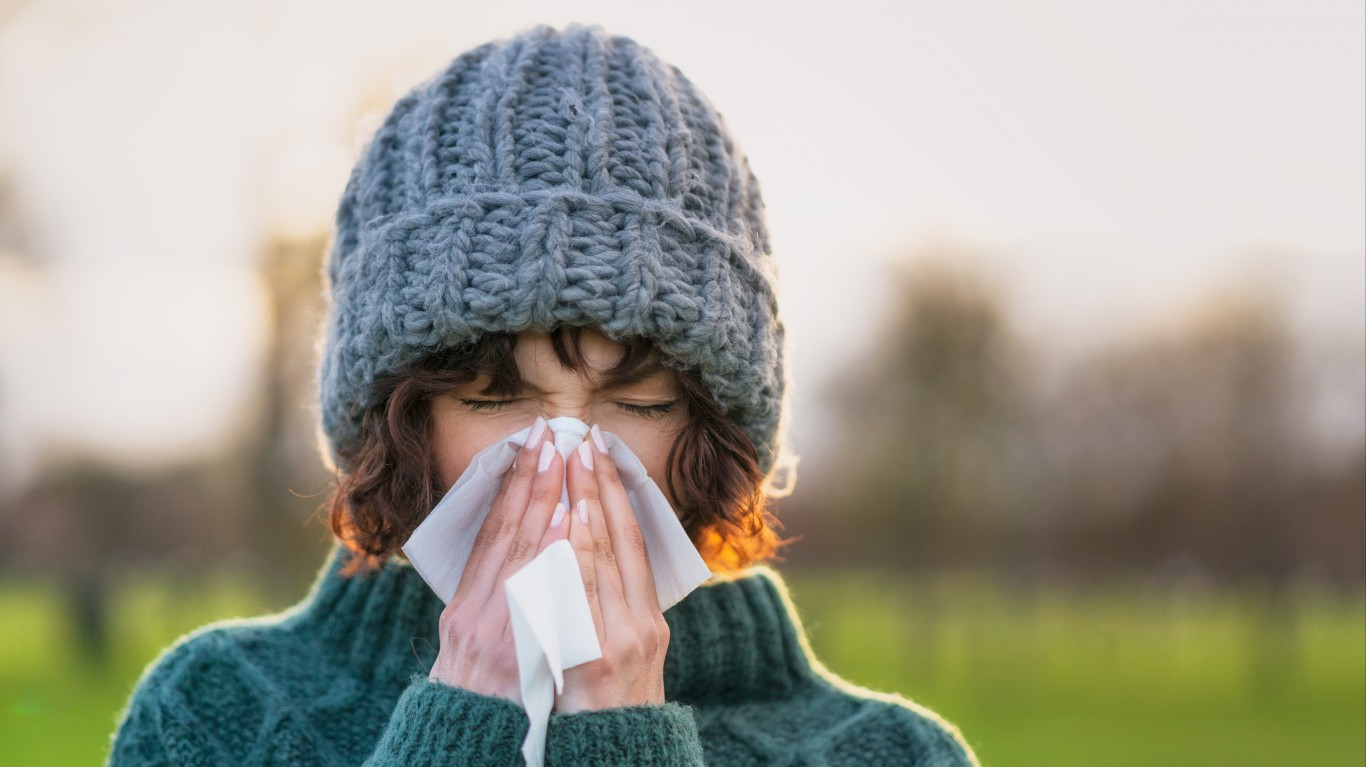
Colds
There is a reason winter is called “cold season.” There are more than 200 viruses that cause the common cold, but most often the culprits are rhinoviruses, which thrive in colder temperatures. Another reason that people get more colds in winter is that they spend more time indoors, exposing them to groups of people — and their germs — in confined spaces. Contrary to common belief, you cannot catch a cold by failing to dress warmly enough when you venture out.
[in-text-ad]

Flu
The flu is caused by the influenza virus and is distinguished from a cold in that it causes fever, chills, and body aches in addition to the stuffy nose, cough, and sore throat that characterize the common cold. Some people are at a much higher risk of developing serious complications from the flu. The Centers for Disease Control and Prevention estimates that between 12,000 to 79,000 people died annually from the flu since 2010.
Flu season begins in October and does its worst at the height of winter. And though the numbers vary from year to year, according to the CDC, getting the flu vaccine in advance of winter can reduce your chance of getting the flu by 40% to 60%.

Sore throat
Usually caused by viruses, sore throats are symptoms of colds and flu, though they can also be caused by allergies or result from simply breathing dry winter air with the mouth open while sleeping. According to Britain’s National Health Service (NHS), there is some evidence that going from warm to cold temperatures can make your throat feel sore.

Strep throat
About 10% of sore throats are caused by a bacterial infection, and usually the culprit is the streptococcus bacterium, which causes strep throat. Because it is highly contagious, strep throat circulates in winter when groups of people are more likely to be in close quarters. Unlike a conventional sore throat, untreated strep throat can have serious consequences, leading to kidney inflammation or rheumatic fever.
[in-text-ad-2]

Pneumonia
Pneumonia is an inflammation of the lungs, usually caused by airborne viruses or bacteria. Like so many winter ailments, its prominence in the colder months is attributed to people being in close proximity. Pneumonia is a leading cause of death, largely because it often goes undetected as its symptoms vary and mimic those of other illnesses, such as the flu. The CDC estimates that 50,000 die of pneumonia each year.
People are particularly vulnerable to getting pneumonia when they suffer from a cold or the flu because their immune system is already being taxed. And because of their particular vulnerability, the CDC encourages people over 65 to get two different pneumonia vaccines.

Asthma
For people with asthma, the cold dry winter air makes symptoms worse, particularly when exercising outside. Dry air irritates airways, causing wheezing and shortness of breath. Colds and flu also trigger asthma, as do indoor allergens such as dust and mold.
[in-text-ad]

Norovirus
Norovirus is an extremely contagious stomach disorder whose symptoms include nausea, vomiting, and diarrhea. Like other illnesses that spread easily from person to person through contact, norovirus thrives in winter when people are more likely to spend a lot of time indoors among other people.
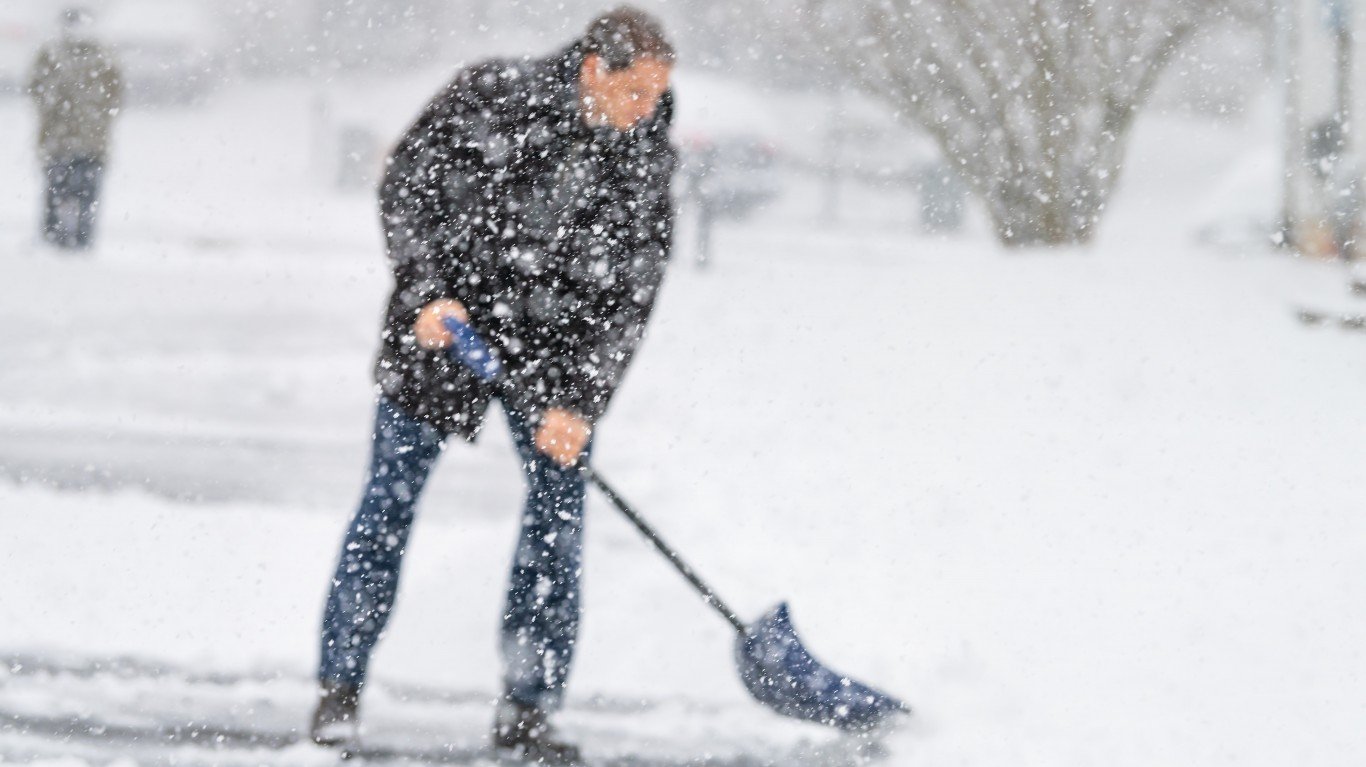
Heart attacks
Heart attacks are more common in winter, perhaps because the cold weather increases blood pressure, straining the heart. There is also a strong link between depth and duration of snowfall and heart attacks among men, and it is estimated that about 100 people — mostly men — in the U.S. die of heart attacks from shoveling snow each year.
Blood pressure normally rises with exertion, and in the winter cold, blood vessels are already constricted, increasing the threat of heart attack. Shoveling and other extreme activity in winter is particularly unsafe for those who already have heart disease or who are normally sedentary.

Arthritis pain
Many people with arthritis experience significantly increased joint pain in the winter, but the reason is unclear. Some studies suggested that changes in barometric pressure could be the reason, while others point to a combination of humidity and cold, with pain and stiffness increasing on cold damp days. Another theory suggests that dry air in the winter makes it more difficult to stay hydrated — and proper hydration is essential for joint health.
[in-text-ad-2]

Weight gain
Holiday indulgence and reduced activity are the big contributors to weight gain in winter, but stress, depression, and changes in sleeping habits can also play a role. The holidays alone are responsible for an average weight gain of 1 to 3 pounds, and the stress around holiday time can increase overindulgence in rich food.

Bronchitis
Bronchitis is an inflammation of the bronchi — the larger, upper air passages to the lungs — which causes excessive production of mucus. Bronchitis is a winter hazard because it is usually brought on by a cold or flu, with symptoms similar to the flu but distinguished by wheezing, troubled breathing, and coughing, which can continue for weeks after the disease has run its two-week course. Unlike acute bronchitis, some 9 million Americans have chronic bronchitis — defined as having mucus-producing cough for at least three months of the year for two years in a row.
[in-text-ad]
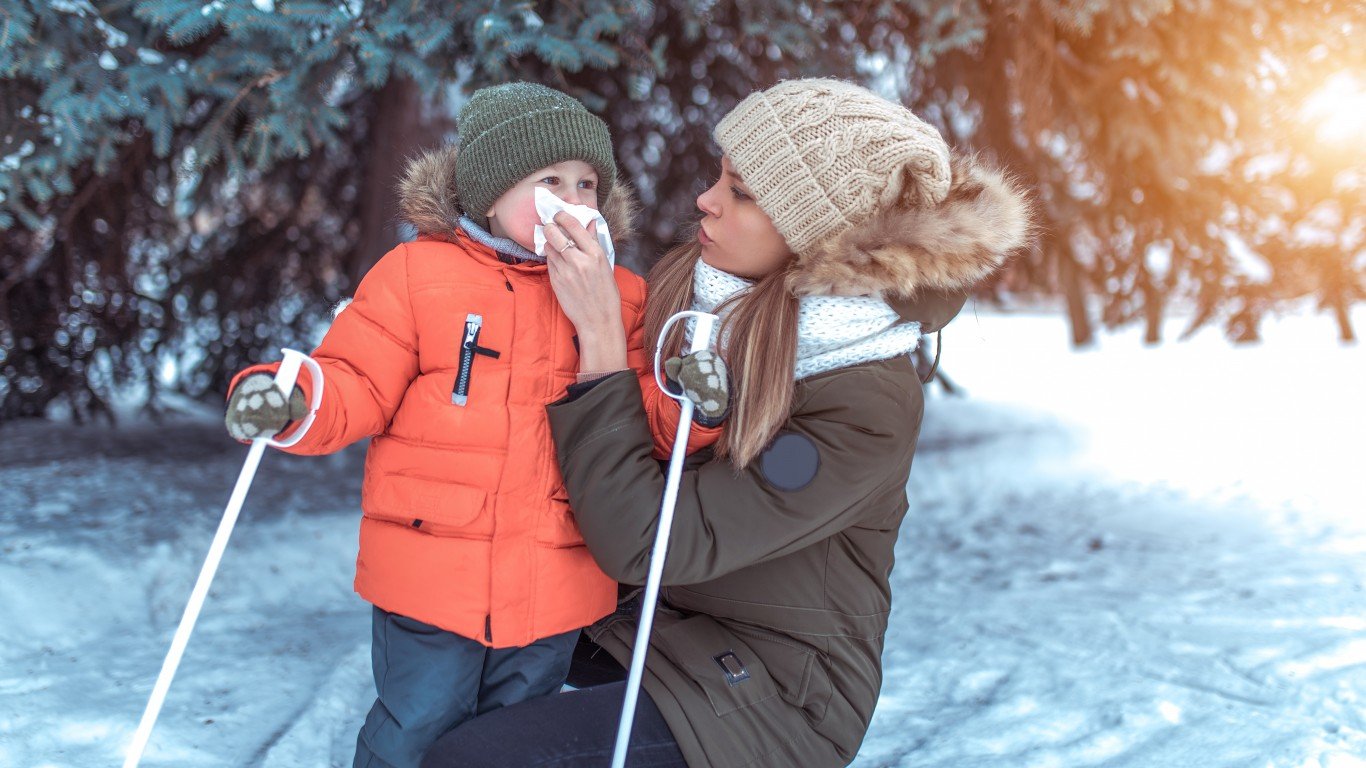
Bronchiolitis
Most common in infants and children, bronchiolitis differs from bronchitis in that it affects the smallest airways in the lungs, called bronchioles, though the symptoms are similar, particularly the difficulty breathing. Bronchiolitis is usually caused by the respiratory syncytial virus (RSV), which like cold and flu viruses, circulates more easily in the winter. Bronchioloitis can be dangerous for young children, with newborns the most vulnerable because of their underdeveloped lungs and immune systems.

Dry skin
Winter’s low humidity can make skin dry and itchy, and the long, hot showers that relieve the chill of winter cold only make dry skin problems worse. Though dry skin is a relatively mild irritant, it can cause painful cracking or lead to dermatitis, eczema, or infection.
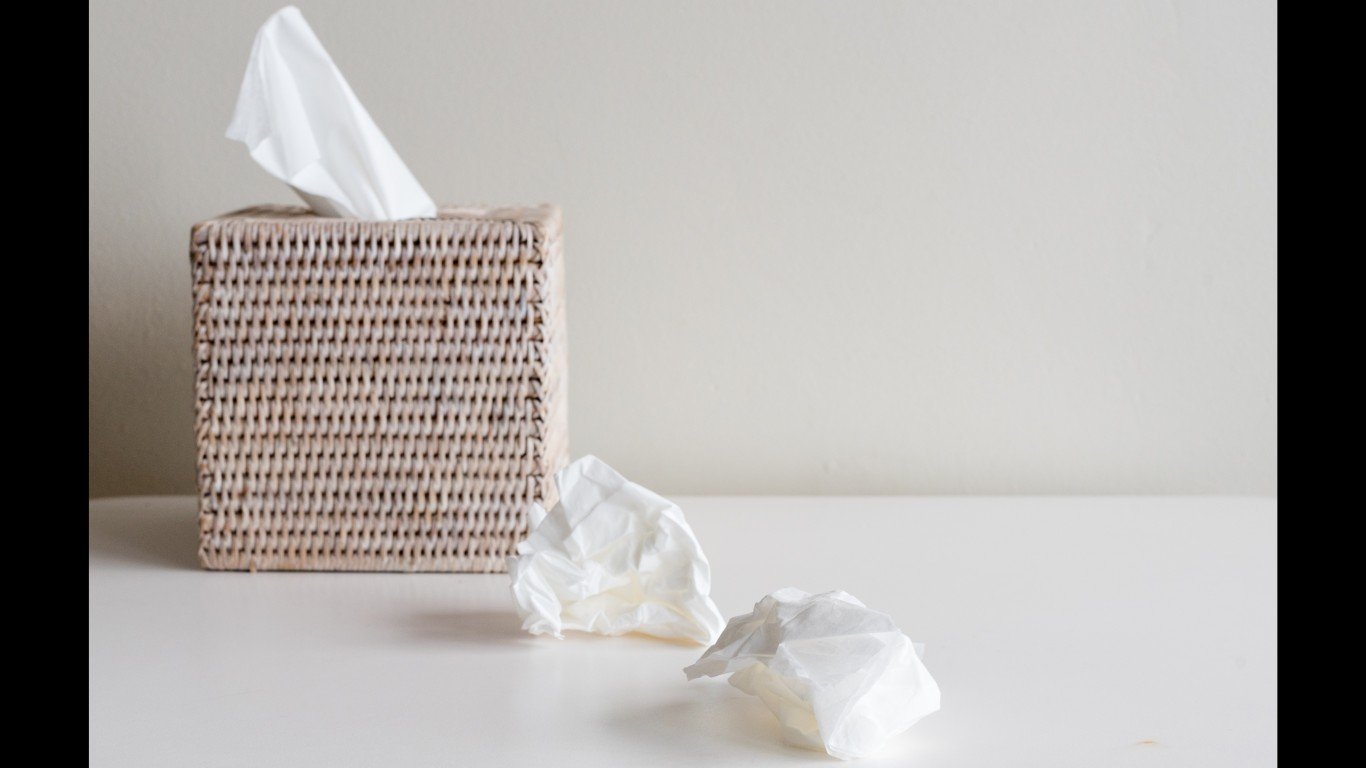
Dry mucous membranes
The sinuses — hollow cavities in the skull — suffer when mucus membranes dry out in the winter, sometimes causing sinus discomfort, dry mouth, sore throat, headache, and nosebleeds. Allergies, triggered by irritants found indoors like mold, can make symptoms worse by inflaming dry membranes and causing mucus to become thick and sticky.
[in-text-ad-2]
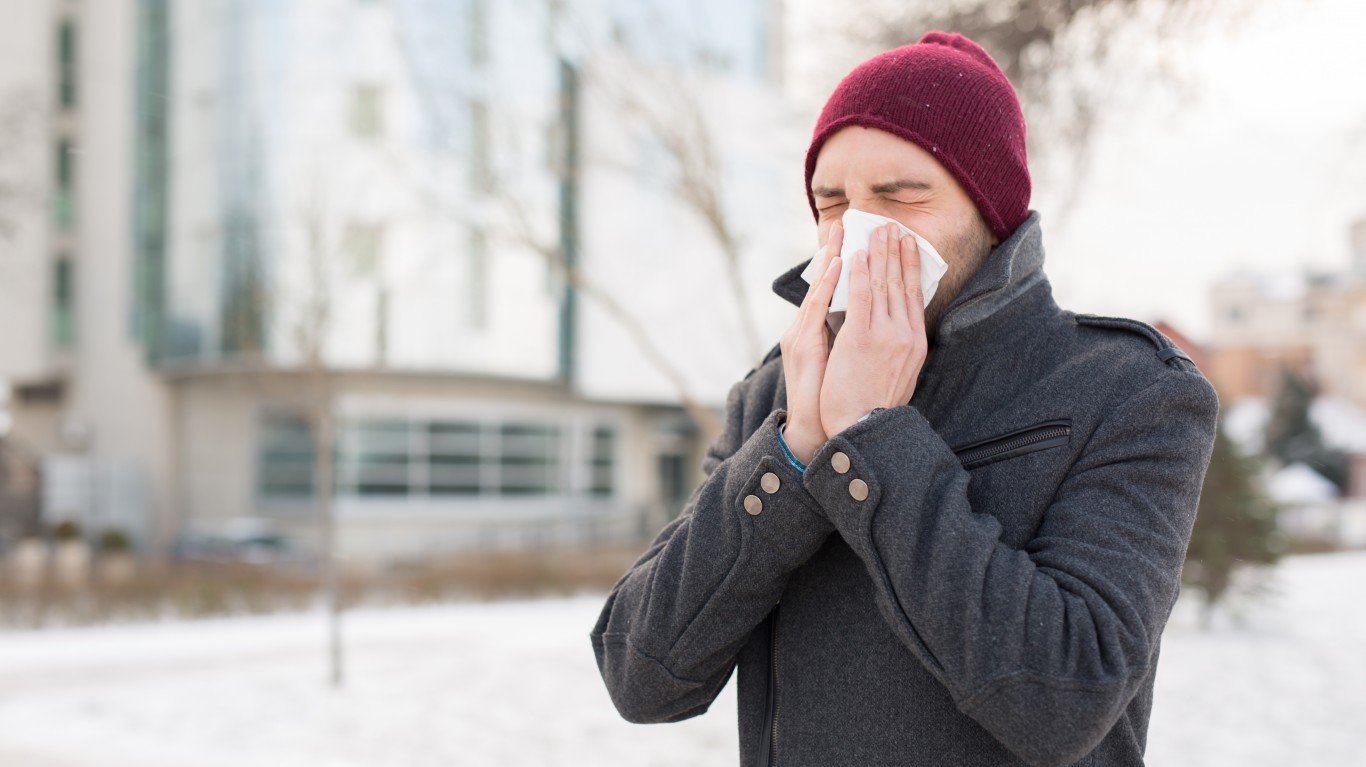
Sinus infection
People suffering from a cold, seasonal allergies, or a weakened immune system, are candidates for sinus infection. Sinuses become infected when fluids build up, allowing viruses or bacteria to grow. These infections can cause headaches, stuffy or runny nose, post-nasal drip, coughing, and bad breath.

Cold sores
Winter reliably provides the conditions for cold sores, caused by the herpes simplex virus. Cold sores are highly contagious and most likely to present themselves when people are suffering from dry skin, when they are stressed or feeling run down, or when their immune systems are being challenged.
[in-text-ad]

Frostbite
Frostbite is an injury caused by exposure to very cold temperatures. A frostbite leads to loss of color and feeling in the parts of the body that are exposed, usually extremities such as toes, fingers, and facial features — even the eyes. It can cause serious injury and, in extreme cases, require amputation of the injured body part.

Hypothermia
Prolonged exposure to cold temperatures can cause hypothermia — when the body uses up its heat faster than it is able to produce it. Even mildly cold temperatures can cause hypothermia if the person is wet and cold. As the body’s temperature drops, the brain is affected, leading to confusion and reduced ability to function — such as getting needed help. In the United States, there were an average of 1,301 hypothermia deaths per year between 1991 and 2011.

Allergies
Indoor allergens, such as dust mites, mold, mildew, and pet dander, are around all year, but most people spend more time indoors in winter, making them more vulnerable to these allergens. Allergies often feel much like a cold, but while a cold will run its course in a few days to two weeks, allergy symptoms will continue with exposure to allergens.
[in-text-ad-2]

Migraines
People who suffer from migraines often experience spikes in their symptoms with seasonal changes. In winter, migraine headaches may be triggered by changes in barometric pressure, dehydration (caused by cold, dry air), or, for unclear reasons, by temperature changes.
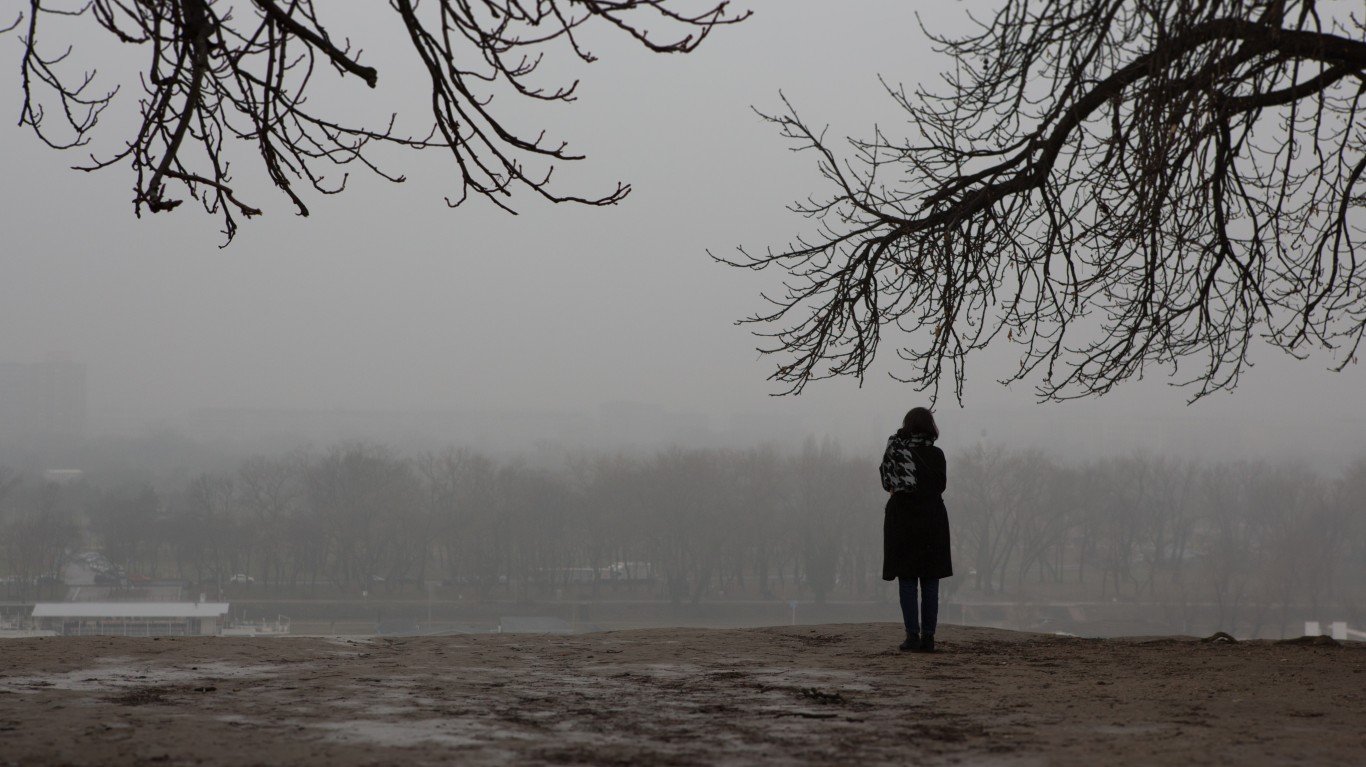
Winter blues
Many people experience periods of darker moods and lack of energy in the winter as they tire of the cold and shorter days. Winter can feel gloomy relative to other seasons, but for most people, the gloom doesn’t affect the ability to function or enjoy life. The more serious winter depression is known as seasonal affective disorder, or SAD.
[in-text-ad]

Seasonal affective disorder (SAD)
For those who suffer from seasonal affective disorder, depression recurs with the onset of winter and permeates their lives. It can be debilitating for some, affecting work and social interactions. The primary cause of SAD is the reduced amount of natural light people are exposed to in the winter months. Lower levels of sunlight can cause changes in the amount of serotonin, a chemical the body produces, and the hormone melatonin — both associated with mood. Changes in the amounts of both can interfere with natural sleep/wake cycles.

Cold hands and feet
Cold hands and feet are common in colder weather and are usually associated with Reynaud’s syndrome, an ailment caused by the narrowing of the smaller arteries in the cold months, though it is not understood why this narrowing occurs in some individuals and not others. Though it is not considered a serious health threat, it affects the quality of life of those who suffer from the condition.

Being Sedentary
To the extent that the cold weather keeps people indoors and relatively inactive, long-term health can be affected. Recent studies have shown that being sedentary — sitting for hours at a time without occasional activity, however limited — can lead to early death, and the effects cannot be undone by exercise. The longer the periods of inactivity, the greater the increase in mortality rate.
[in-text-ad-2]

Car accidents
Snow and ice cause dangerous road conditions — such as slippery surfaces, reduced visibility, and obscured driving lanes — that contribute to highway deaths and injury. According to the Federal Highway Administration, every year, more than 1,300 people are killed and another 116,800 are injured in car accidents on snowy, icy, or slushy roads.
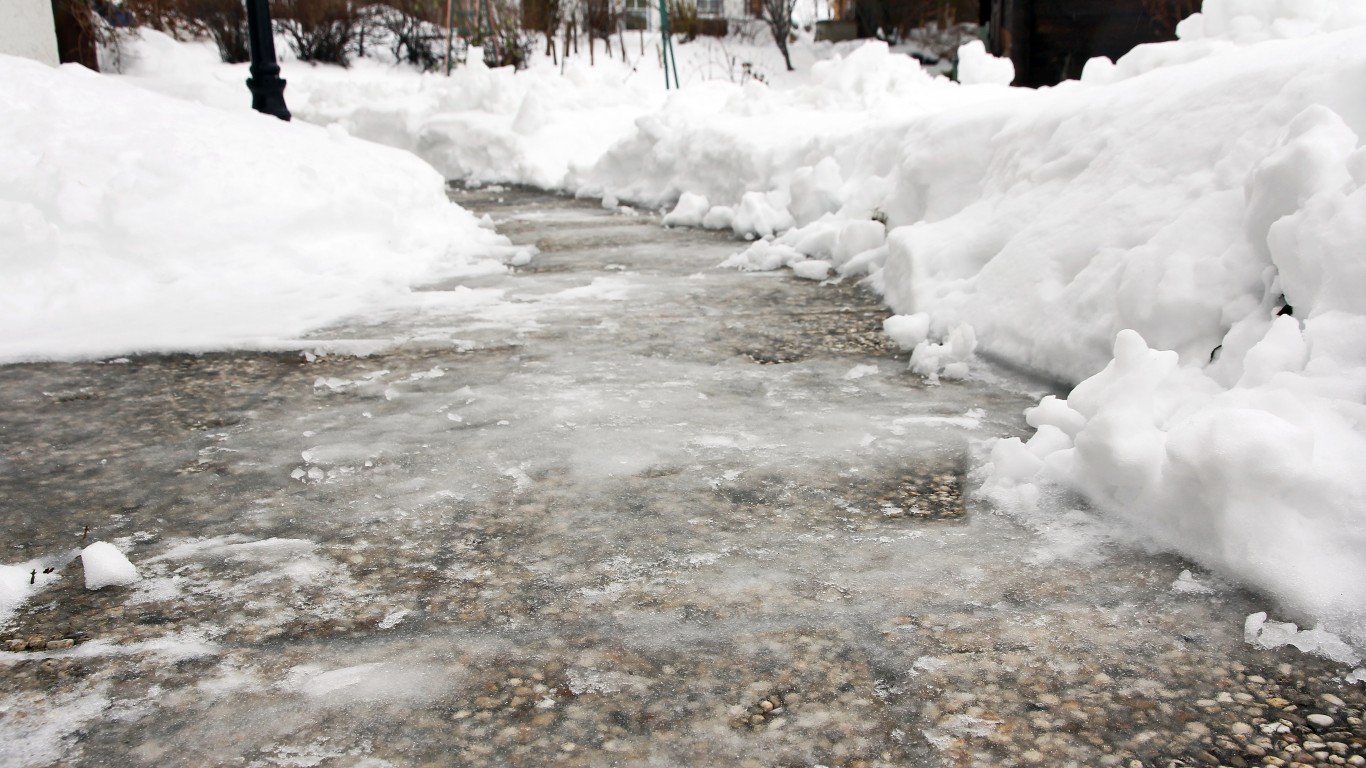
Falling
Injuries from slipping and falling increase during the winter months in the colder regions of the country. The elderly are most vulnerable to cold weather conditions — ice, snow, and wind. According to data published by AARP, two of the coldest states, Wisconsin and Minnesota, have some of the highest numbers of senior fatalities from falls.
[in-text-ad]

Carbon Monoxide poisoning
Carbon monoxide exposure is one of the leading causes of accidental poisoning in the United States, mainly from faulty heating units. In the first decade of this century, an average of 500 people died and 15,000 people required emergency room treatment every year. Most reported carbon monoxide exposures occur in the winter and mainly in residences, and they tend to be concentrated in the Northeast and Midwest.

Earaches
Ear infections are caused by a build-up of fluid in the middle ear, usually when the ear’s eustachian tubes are swollen and blocked. Ear infections, which occur more frequently in the colder months, are not contagious themselves, but they can be caused by colds, allergies, and exposure to smoke.

Croup
Caused by the same viruses responsible for the common cold, croup affects very young children, mainly in fall and winter. The most pronounced croup symptoms in children under 3 are wheezing, difficulty in breathing, and a bark-like cough that is terrifying to parents. Counterintuitively, symptoms can be relieved by taking the child outside to breathe cool, dry air, or into a steamed up bathroom to breath hot, wet air.
[in-text-ad-2]

Whooping Cough
Whooping cough — also known as pertussis — is a serious respiratory disease characterized by a persistent cough that can last for over 10 weeks. Pertussis can be deadly, particularly to infants. It is caused by an airborne bacteria, but people can be protected through inoculation. Unfortunately, pertussis appears to be on the increase. In 2012, the CDC reported 48,277 cases of pertussis in the United States, the highest incidence of cases since 1955.

Pink eye
Pink eye, or conjunctivitis, one of the most common winter health conditions, is also one of the most contagious when caused by a virus or bacterium — not so when caused by allergies or other irritants. Symptoms include itchy, watery eyes, crusting of eyelids, and redness in the whites of the eye.
Sponsored: Want to Retire Early? Here’s a Great First Step
Want retirement to come a few years earlier than you’d planned? Or are you ready to retire now, but want an extra set of eyes on your finances?
Now you can speak with up to 3 financial experts in your area for FREE. By simply clicking here you can begin to match with financial professionals who can help you build your plan to retire early. And the best part? The first conversation with them is free.
Click here to match with up to 3 financial pros who would be excited to help you make financial decisions.
Thank you for reading! Have some feedback for us?
Contact the 24/7 Wall St. editorial team.
 24/7 Wall St.
24/7 Wall St. 24/7 Wall St.
24/7 Wall St. 24/7 Wall St.
24/7 Wall St. 24/7 Wall St.
24/7 Wall St.


